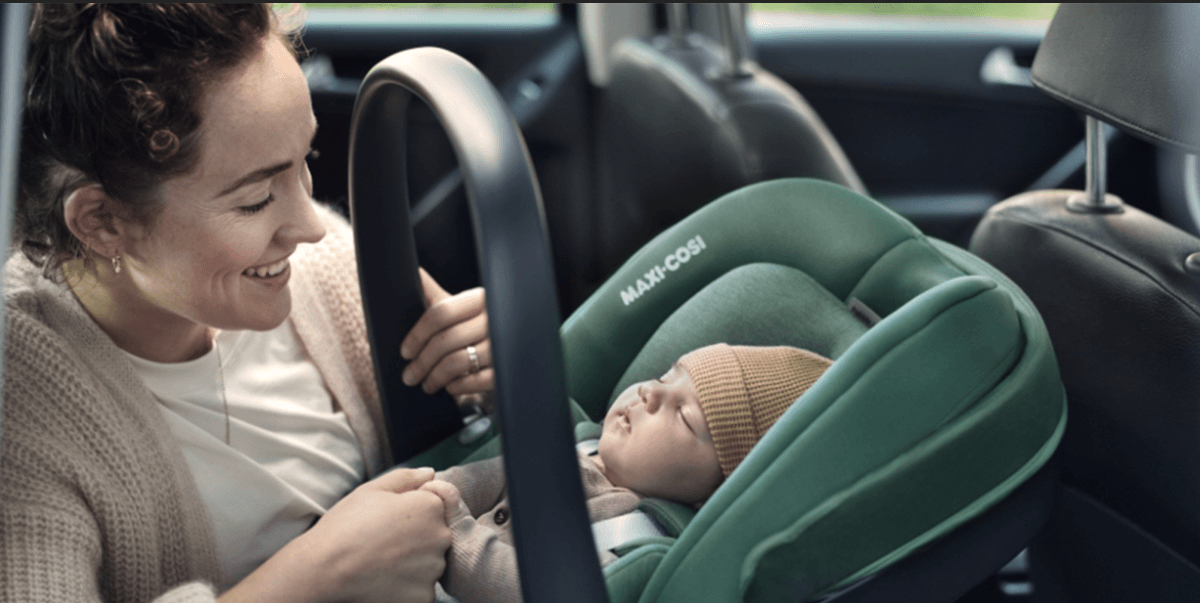5 Car Seat Safety Tips For Baby
Important safety information to be aware of when using an infant car seat with your baby
We all want our babies to be safe and one of the key items of safety equipment we buy for our little ones is an infant car seat. In fact, your baby’s very first journey home from the hospital or birthing centre should be in a car seat appropriate to their age and size – some hospitals ask to see your seat before you leave to ensure your first journey is as safe as possible. Here’s all you need to know about car seat safety.
The Law Says:
The UK law says that in any vehicle – that’s cars, vans and goods vehicles;
- A child must be in an appropriate car seat from birth up to 12 years or 135cm tall, whichever they each first
- Children over 12, or a child who is over 135cm tall even if they are not yet 12, can use a normal seat belt
The driver is always the person responsible for the safety of passengers in the car.
Car seats should conform to UN and ECE standard 44.04 (or R.44.03) or to the EU i-Size regulation R129. You’ll see this number on the seat or its label.
Which Direction Is Safest For a Baby Car Seat?
A rearward facing car seat has been demonstrated to be the very safest for your baby. Children involved in accidents have far fewer, and less serious, injuries in a crash if they were in a rearward facing seat. So, it makes sense to have your child rearward facing as long as possible and certainly up to four years.
The Harness
Most seats have a three- or five-point harness with a buckle in the middle. Make sure that the harness is properly done up each time you travel and that the straps are pulled tighter to your child’s chest – you should just be able to fit two fingers against your baby’s shoulders under the harness.
Fixing The Seat Into Your Car
There are three ways that seats fit into your car:
- Using your car’s three-point seatbelt
- Using Isofix points on the car seat and in the car
- Using an Isofix base, onto which the seat clicks
Make sure you check the fit of the seat and the safety and engagement of the Isofix points at regular intervals. Always check the belt is fitted properly with every journey.
What to Wear
Babies should never wear puffy coats or snowsuits in a car seat. Not only are these a risk to your baby for overheating but they also make it difficult to adjust the seat’s safety harness properly.

Where to Sit The Car Seat
Your baby’s car seat is safest in the back seat and the central seat is the safest part of that – it is therefore away from potential side impacts. If you do have to have the car seat in the front seat with you, you MUST make sure your car’s airbag is disabled by your car’s dealership.
How Long Should My Baby Be in a Car Seat?
Car seats are made for your baby’s safety but it is important to remember that they are made for travel by car – they are not a baby seat or bed for use at other times, when you are not in the car.
Newborn babies should lie as flat as possible for most of the time, apart from when they are in your arms, or in a sling. The position in which your baby sits in the car seat can may affect their breathing – they may slump, with the head falling to the side or onto the chest and this makes it difficult to breathe. They are also too small to be able to raise their head, as their muscles are not yet strong enough. So, it’s important to follow the car seat safety rules:
- If you are traveling by car, even for a very short time, the safest place for your baby is in a safety-tested infant car seat
- For newborns and for the first four weeks, try to ensure car journeys are 30 minutes or less.
- If a longer journey is unavoidable, have an adult sitting in the back seat with the baby to regularly check on them. Have a break every 20-30 minutes.
- For older babies, take a break from driving every two hours and take your baby out of the car seat. This will help you have a break too and allow you to feed and change your baby too.
- When you reach your destination, take your baby out of the car seat and lay them flat in a cot or crib. Don’t leave them in the car seat, even though they might be asleep.
- Never leave a baby of any age in the car seat for longer than two hours - that’s in the car, in your home or on the pushchair when using it as a travel system.
Car Seats That Grow With Your Child
Many parents wonder when to move the headrest and harness as your baby grows. Your baby’s head should be held within the headrest, with the lowest edge of the headrest level with your baby’s shoulders. Move the headrest and harness (some move simultaneously) as they grow and if there is a newborn insert in your seat, remove that when appropriate – see your seat’s instructions. Once your child has reached the upper size limit for the seat or the upper weight limit, you must move up to the next seat.
Further Reading:
Top Travel Hacks for Busy Parents
Travelling with a Newborn? Here Are Our Top Tips For An Easy and Stress-Free Journey
See The Essentials You Need When Travelling With a Baby




